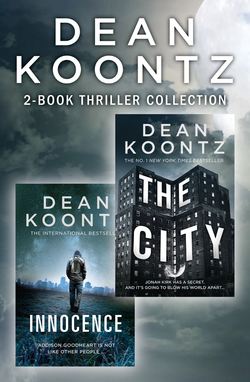Читать книгу Dean Koontz 2-Book Thriller Collection: Innocence, The City - Dean Koontz, Dean Koontz - Страница 43
Thirty-two
ОглавлениеIN THE COMMONS, ON THE FOOTPATH BY THE pond, I waited in a cold that deepened by the minute, thinking I might see the first crystals of ice form on the shallow black water along the shore.
Gwyneth wasn’t late. I was a few minutes early. I hadn’t quite finished picking up all the broken glass and china on her kitchen floor, but all of a sudden I had felt an urgent need to get out of there. I don’t know why. I was overwhelmed by the feeling that when I’d closed the bedroom window, I hadn’t latched it, and that someone or maybe something was at that minute climbing the fire escape and soon to enter the apartment with bad intentions.
So affecting was that intuition, I abandoned caution and left by the front door, went down the communal stairs two at a time, at risk of encountering one of the neighbors, and burst into the night as if I had been blown out of the house by an explosion. There was traffic in the street, but I was hooded and masked and gloved, and I dodged across the lanes to a Gershwin-jazz performance of car horns and shrilling brakes.
Just inside the gate to the Commons, I paused under the great pine where Gwyneth and I had stood the previous night, and looked back toward the house, expecting something to be at her living-room window, but it was just a rectangle of unobstructed light. Hopeful that I had not been seen in flight, I continued to the pond, where now I stood in expectation of the first ice.
Because I had earlier remembered the murdered nurse found in the water and now stood near the spot where she had been pulled to shore by the coroner, pity swelled in me, not just for the dead woman and her family but also for the city, though certainly the city did not want my pity. So tender did this feeling become that I knew I was losing the degree of self-control that I needed every minute that I was aboveground.
When I tried to turn my thoughts away from the nurse, they went unaccountably to the marionette, of all things. As irrational as it may sound, I wondered if the puppet had sat on this shore for part of that grim night, watching her pale body float and the koi bump against it under the mistaken impression that it was a great mass of bread thrown to them by admirers. Seemingly irrational, yes, but the thought became an image in my mind’s eye, and I felt in my bones that it was true, and I wished that I had not come to the Commons sooner than necessary.
Precisely then the first snow frolicked down the sky, flakes as big as rose petals, wheeling through the bleak dark and flaring in the light of the pathway lamps. They vanished into the black water but gathered on the stiff brown grass and on the pavement. So quickly did smaller snowflakes follow the larger ones in such greater numbers that I knew this would be a storm that the city would long remember, whereupon the night breeze stiffened just enough to be called a wind.
When I looked at the dead man’s watch on my wrist, I saw that the moment of our rendezvous had arrived. On time, the Land Rover appeared, following the one-way blacktop service lane, but then she turned off the road and drove across the picnic meadow, to the shore of the pond, switching from headlights to parking lights as she drew near.
The vehicle looked immense, maybe because I knew Gwyneth was petite and I couldn’t quite believe that a hundred-pound girl could maintain control of such a formidable machine. I was also a little spooked because I’d never ridden in a motor vehicle before, only under a tarp on a flatbed and only once.
Sometimes your life rolls away with you, like a big stone going downhill fast, as on the day when my mother put me out on my own, and then nothing is ever the same. I could feel my long-stable world in motion again, beginning here, as Gwyneth stopped the Rover beside me, and though the roll can sometimes be a good thing, and you come to rest in a better kind of life, there are no guarantees.
If that night I had listed a thousand ways that my coming life might possibly be different from the one I had lived for the past eighteen years, what I might lose and gain, I would not have proved prescient about anything, and I would have greatly underestimated both the losses and the gains.
